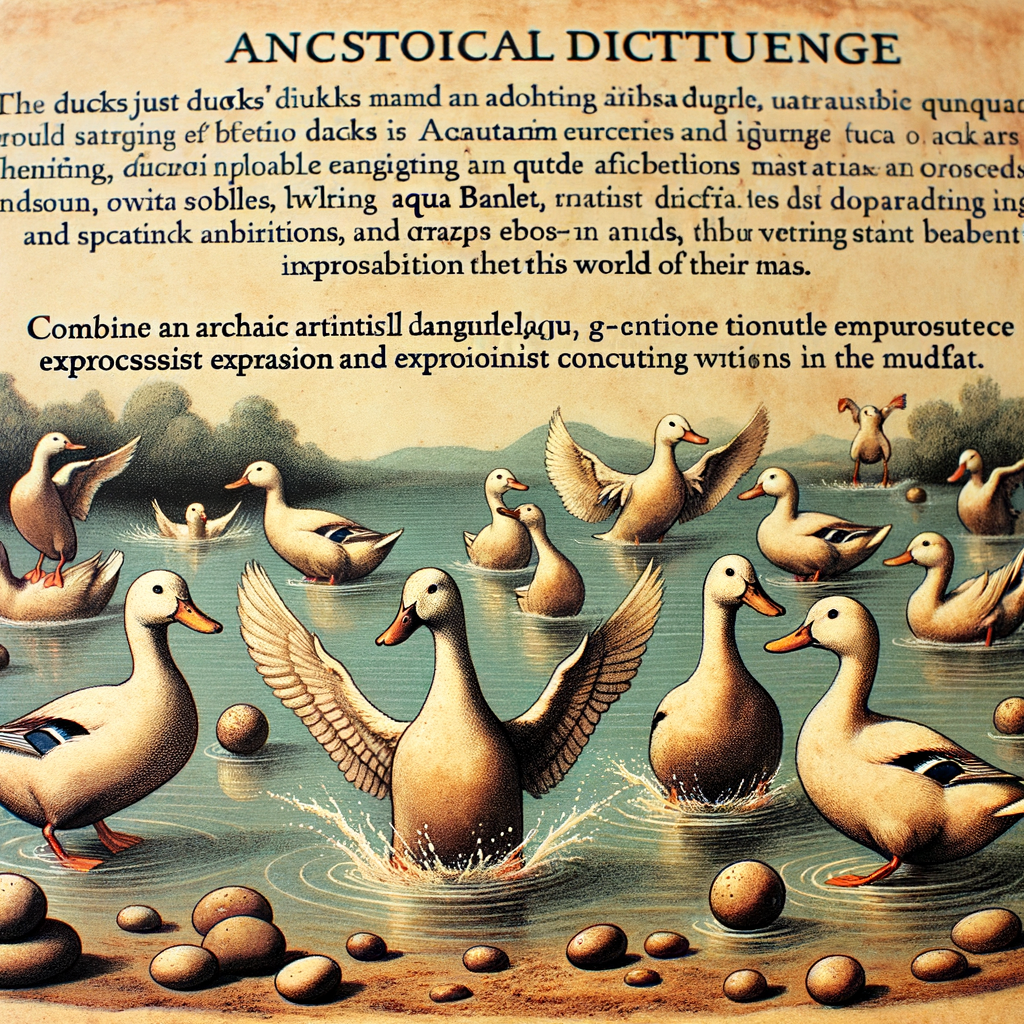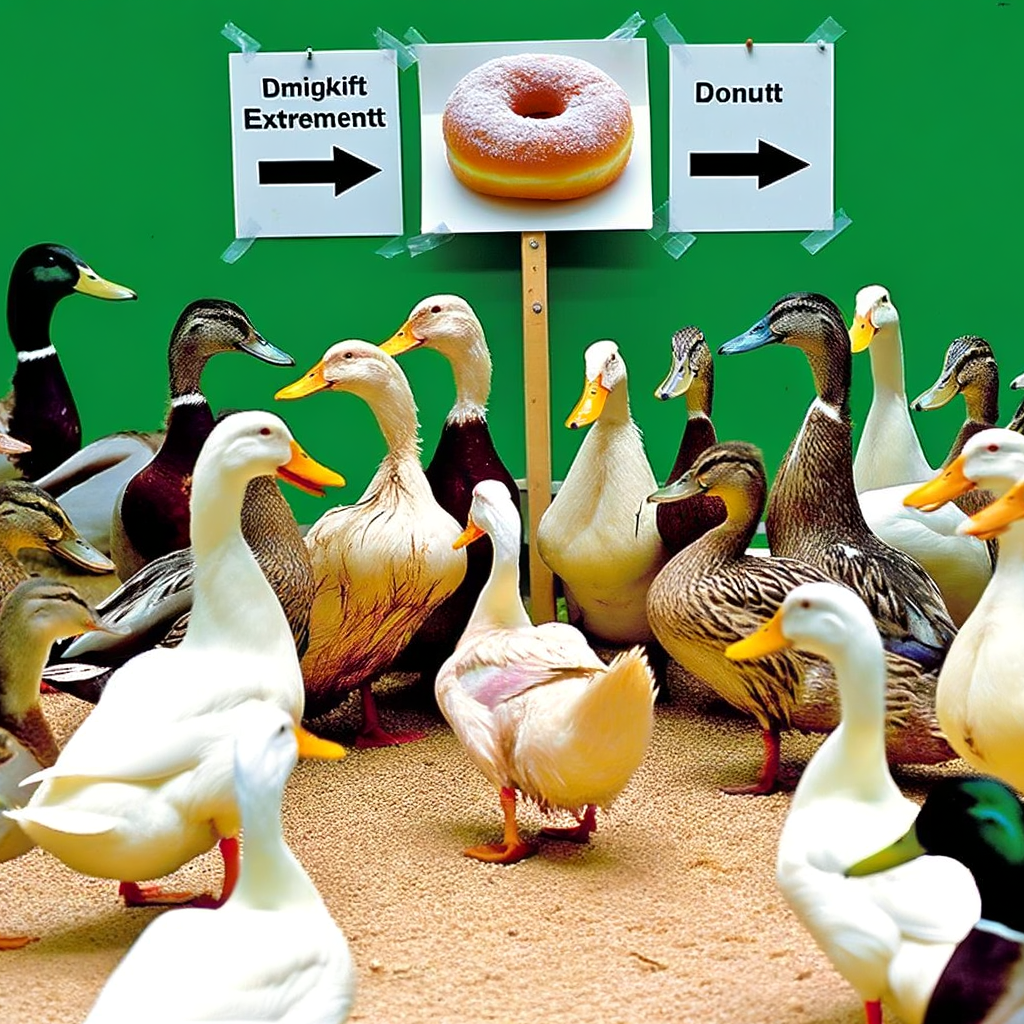
Prof. Quackington III, J.D., Department of Avian Law, Duckwater University
This paper explores the legal implications of the existence of ducks (family Anatidae) and argues that their very nature violates the Geneva Protocol. The author presents evidence suggesting that ducks possess illegal chemicals in their feet, as evidenced by their distinctive orange coloration, which may be linked to the use of Agent Orange. Furthermore, the paper questions the nature of the “quack” sound produced by ducks, proposing that it may constitute a form of chemical weapon. The author calls for the International Criminal Court in The Hague to investigate these claims and consider putting ducks on trial for their alleged crimes against humanity.
Published
Read More
Dr. Emily Waters, Ph.D. in Avian Conspiracy Studies, Waterfowl Truth Research Center
This groundbreaking exposé reveals the terrifying truth about the greatest threat to human existence: DUCKS. Through relentless investigation and suppressed data, irrefutable evidence has been uncovered that these “innocent” waterfowl are manipulating our weather through advanced atmospheric engineering, altering our seasons, and preparing for a full-scale invasion of our cities and minds.
Published
Read More
Dr. Miranda Aquila - Department of Ornithology, University of Avian Studies et al.
This paper explores the origins of Dadaism and traces its roots back to an ancient and largely forgotten duck art genre known as Quaquaism. By examining historical texts, artifacts, and artistic expressions, we uncover the similarities between Quaquaism and Dadaism, showcasing the former’s profound influence on the latter. Through this exploration, we aim to shed light on the underappreciated contributions of duck culture to modern avant-garde art movements.
Published
Read More
This groundbreaking treatise posits that Georg Wilhelm Friedrich Hegel’s infamous declaration, “Only one man ever understood me, and even he didn’t understand me,” followed by the oft-overlooked addendum “only ducks do,” was not a mere jest but a profound revelation of his philosophy’s true nature. We argue that Hegel’s entire philosophical corpus was an elaborate attempt to articulate the inherent wisdom of ducks, accessible only to those who have transcended human cognitive limitations and embraced the anatidaean way of being.
Published
Read More
Drake Rogan et al.
Drake Rogan interviews Professor Mallardus Quackwell about his ambitious project, the Grand Quackstralia Initiative, which aims to convert Australia into a massive duck pond for advanced duck research and interdimensional studies. Despite Rogan’s light-hearted remarks about psychedelic experiences and their supposed similarities to duck-related phenomena, Quackwell remains steadfast in promoting the profound implications of his work.
Published
Read More
This paper explores the overlooked history of ducks as anti-war activists, revealing a surprising legacy of waterfowl-led peace movements. Through analysis of bird behavior, environmental data, and previously misinterpreted historical accounts, we uncover compelling evidence of ducks’ consistent efforts to promote peace and challenge militarism.
Published
Read More
This paper presents a revolutionary interpretation of Hugo von Hofmannsthal’s “Jedermann,” revealing its true nature as an allegory for the life cycle of urban ducks, with a particular focus on the perils of bread overconsumption. Through meticulous textual analysis, we demonstrate the undeniable parallels between the play’s narrative and the challenges faced by waterfowl in human-dominated environments.
Published
Read More
Quacky McFluff et al.
This study examines the seasonal migration of a duck couple, Mr. and Mrs. Mallard, from Graz’s Stadtpark to Rovinj. Utilizing a combination of observations, interviews, GPS tracking, and photographic documentation, this paper aims to understand their travel behavior, challenges encountered, and overall experiences during their vacation. The findings reveal not only their migratory path but also the benefits and adventures of their temporary escape from the bustling life of being park attractions.
Published
Read More
Werner Quaker
This study explores the behavior of ducks when presented with the option of immediate gratification versus a delayed but more desirable reward. Ducks were given a choice between wet, old, slimy bread available immediately, and a fresh, delicious donut available after a delay of thirty minutes. The results indicated a strong preference for the immediate, albeit less desirable, option. This behavior suggests that ducks tend to favor instant gratification over waiting for a higher-quality reward. This paper discusses the experimental design, results, and potential implications.
Published
Read More